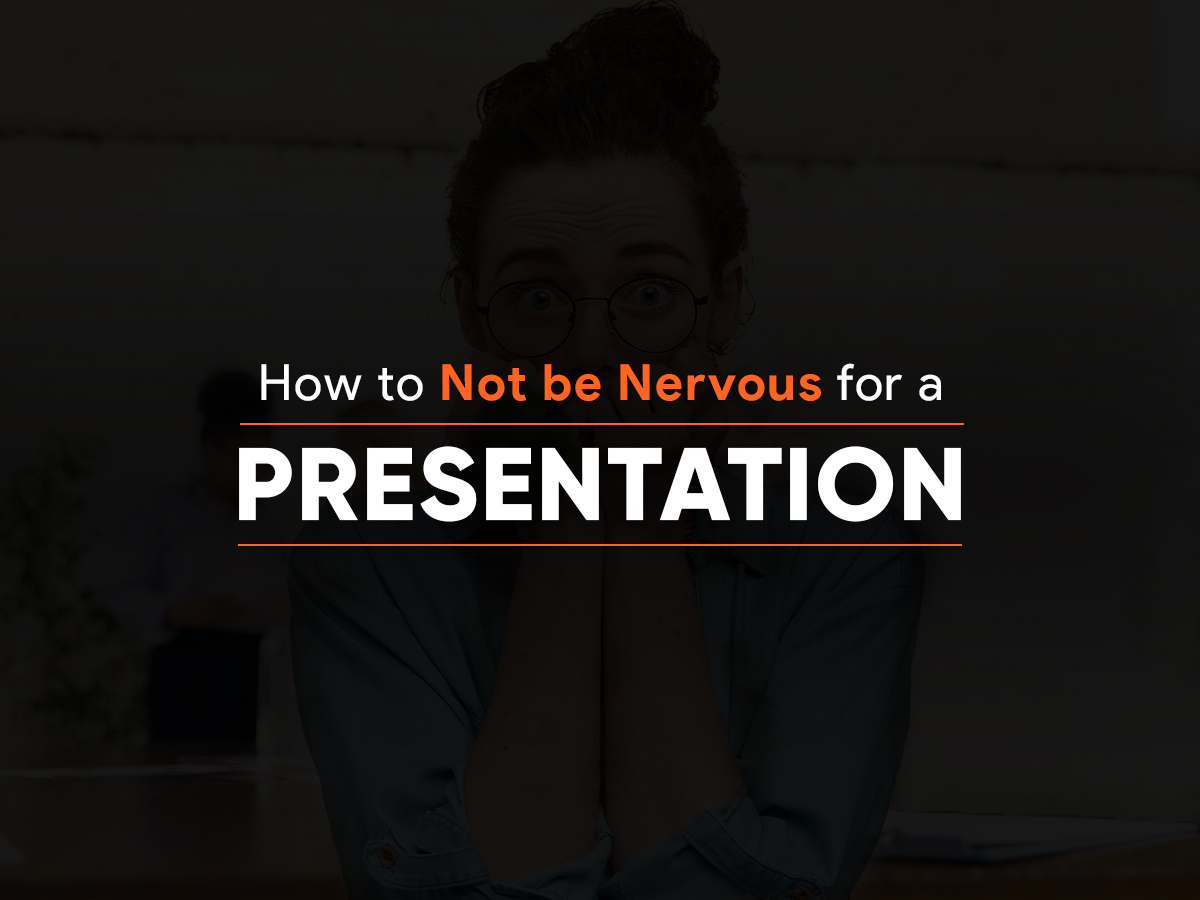- Presentation Anxiety Tip 1: Recognize, Accept, and Reconstruct
- Presentation Anxiety Tip 2: Start well in Advance
- Presentation Anxiety Tip 3: Convert your Nervous Energy into Enthusiasm
- Presentation Anxiety Tip 4: Arrive Early and get Acclimatized
- Presentation Anxiety Tip 5: Meet and Greet
- Presentation Anxiety Tip 6: Be Aware of your Body
- Presentation Anxiety Tip 7: Regulate your Breathing
- Presentation Anxiety Tip 8: Smile
- Presentation Anxiety Tip 9: Be Well Groomed
- Presentation Anxiety Tip 10: Body Language Matters
- Final Thoughts
How to Not be Nervous for a Presentation – Presentation Anxiety Tips

Making presentations can be really tough – let’s accept that. Very few of us are born eloquent, and facing even a handful of people to deliver a presentation can be pretty daunting. So how can you handle your presentation anxiety? Let’s learn about how to not be nervous for a presentation.
Obviously, not all of us can turn into star performers overnight and master presentation skills. However, there are some steps you can take to calm yourself. We will guide you on how to not be nervous for a presentation in this article. If you are an individual with a tendency for anxiety, this could be more difficult for you, but by no means impossible.
Presentation Anxiety Tip 1: Recognize, Accept, and Reconstruct
A very crucial thing you need to do is to understand and recognize that presentation nerves are normal. Especially if you have never done this before; it is absolutely okay to be a little anxious about your upcoming presentation.
When faced with difficult situations, human beings have what is called a ‘fight or flight’ response. We recommend you do neither. Don’t fight it, and don’t run away from it; it will only add to your anxiety and make things more difficult. Merely recognize the anxiety, and accept it as part of the activity.
In fact, it is rare to find someone who is not nervous or anxious before an important event: athletes or players before competitions or matches, singers before their concerts, even politicians before their speeches – most of them have some anxiety. But they also have their own ways of managing this anxiety and nervousness and don’t let it get in the way of a great performance. Rather than viewing your upcoming presentation as something to fear, think about it as an opportunity to show your skills and knowledge, and add value to your audience.
Remember, if you didn’t care about it, and it didn’t matter to you, you wouldn’t be nervous. You are worried because you want to do a good job!
Presentation Anxiety Tip 2: Start well in Advance
If you want to know how to relax before a presentation, one thing you need to know is that you need to start a little in advance. Here are a few tips:
Practice makes perfect
Rehearse your presentation several times; even if you have a tight work schedule, make time to practice so that when it is time to make the presentation, it comes naturally. Experts suggest that you practice speaking in different positions –standing, walking about, arms open, and so on, as well as in varying settings. Your bedroom, living room, your office – wherever it’s possible to do so without coming across as mental, of course. You could even write down the speech so that you can surreptitiously refer to it in case you have a brain freeze moment temporarily. Another great idea is to make a video recording of your practice presentation. All you need is your mobile phone, and if possible, a tripod. Play it back and see where you need to improve, what you should not do at any cost, and what you’re really good at.
Attend other presentations
That is, if you haven’t done so already, and if there are any presentations or speeches happening close to where you work or live, and a little before your presentation date. You can take cues from the way they present – how confident are they? Are they doing anything that makes them look or sound knowledgeable and confident? How is the audience responding? Answering these questions will give you tremendous insight, and possibly, a few valuable takeaways to incorporate into your own presentation. You can even watch videos of TEDx talks.
Join public speaking clubs
There are several groups or clubs – the Toastmasters for example – that help members to improve their public speaking capabilities. Members present short speeches on selected topics when the group or club gets together. The events usually happen during lunch breaks or after office timings. The more presentations you make, the higher your chances to become an excellent orator. It will definitely help in calming nerves before the presentation.
Take care of the basics
It is important to sleep well at night so that you are well-rested, and your mind is fresh. Ensure that you don’t keep late hours at least a few days prior to your big day. Stay hydrated; not just your throat, your whole body needs proper hydration so that you don’t feel light-headed or tired. Limit your caffeine intake – we are not trying to become Godzilla. Eat a proper, nutritious meal – a hungry tummy can play tricks on your mind, and you may not be able to do a stellar job.
Work out
Go for a jog, do aerobics or Zumba, take a few laps in the pool, cycle a few kilometers, or hit your gym. Choose any exercise you like, and get your endorphins coursing. It is a proven fact that exercise releases the ‘feel-good’ hormone, endorphins. It can significantly improve your mood.
Meditate
Before you say ‘ho-hum’, stop! It does help. Yes, we know, this is one word bandied about in almost any situation. Well, that is because when done properly it helps a great deal in calming you – even lowering presentation anxiety. Meditation simply means emptying your mind, relaxing, and focusing on your breathing. You don’t have to breathe deeply or anything, but simply be aware of your breaths. It is incredibly calming.
On your big day, if presentation nerves are still playing havoc, here is what you should do:
Presentation Anxiety Tip 3: Convert your Nervous Energy into Enthusiasm
What pumps you up – listening to rock music? An energy drink or bar? A shot of espresso? Whatever works for you, whatever helps you transform your nerves into enthusiasm and helps you focus, do it. Even if you are not very eloquent, or let’s say you make a few minor mistakes in the presentation, but are super enthusiastic when you talk, you will have the audience with you. They will hang on to your words – everybody loves an energetic and enthusiastic individual.
Presentation Anxiety Tip 4: Arrive Early and get Acclimatized
Aiming to reach a couple of hours earlier has the advantage of not being late for your own presentation. Give yourself an hour or two – or more – depending on the level of your anxiety, to settle down and familiarize yourself with the surroundings before you have to go up on the stage. It will give you time to adapt to the stage, audience, and the whole environment, in fact, increasing your comfort level. Walk around, check out how big the room or hall is. It will give you an idea of what gestures will be effective, and the expressions that can be seen by your audience for impact.
If you come early enough before the program starts, you can practice with the mike – just saying a few random words is enough – to make sure you sound good. You can ask the sound technicians to adjust the settings to ensure your voice comes across pleasantly to the listeners. Observe the surroundings – are you close to a noisy road, or some other disturbance like construction noise? This will help you adjust your tone and pitch, and how loud you may have to speak. Also, check the lights on the stage, and make sure your audience will be able to see you properly.
Presentation Anxiety Tip 5: Meet and Greet
Once at the venue, take some time to talk to people in the audience. Ask them some questions; it could be about some specific thing they are interested in hearing. Chatting with your audience will make you come across as friendly and approachable, and they will be more likely to listen to everything you have to say – huge confidence booster. You may even get a few points for your speech that you had not thought about earlier.
Presentation Anxiety Tip 6: Be Aware of your Body
This method is one of the ways how to calm down before a presentation. It is normal that when we get nervous, we fail to be in the present, and get caught up in a deluge of self-criticism and negative thinking. ‘What if I say something stupid? What if I forget something important? What if the audience doesn’t feel interested?’ – to name a few things that tend to go through our heads.
At such times, it is a good idea to concentrate on your body, and observe the sensations coursing through it: is your breathing shallow? Do you have a rapid heart rate? Are you sweating? Is your voice cracking? Do you feel a tightness in your chest? If you feel any of these sensations, here’s what you should do.
First, close your eyes, and take a deep breath. In fact, a few deep breaths, and then just look around. Touch the table or chair, grip a marker or pointer in your hand, or shift your body weight to your feet and toes. Shifting your center of gravity to your feet helps take the focus away from your head or chest, and it will literally take the weight off your chest.
If you’ve seen any of the superhero movies, you will remember that our caped saviors have certain poses which help in identifying them – hands on hips, feet apart mostly. It helps in building your confidence. In fact, several people have sworn that it helps them present with confidence.
Presentation Anxiety Tip 7: Regulate your Breathing
This age-old advice is as sound as it gets. Just before you get on to the stage, close your eyes, and take slow, deep breaths. Anxiety causes muscles to tighten up. Deep breathing helps to take in more oxygen, sending it to the brain and body, helping you to relax.
Presentation Anxiety Tip 8: Smile
When you smile, several things happen: your audience will perceive you as a pleasant and likeable person, and will pay attention; endorphins get released, and soothe your nerves, calming you and making you feel good about your presentation. When you smile, it shows the audience that you are confident and enthusiastic, and are keen to make a great presentation.
Presentation Anxiety Tip 9: Be Well Groomed
You need to look the part – not just sound the part This means being properly groomed and looking presentable. Nobody is inclined to listen to someone who is shabbily dressed, with unruly hair. Power dressing is actually a thing. Wearing formal attire for presentations will help build your confidence. It’s not necessary to splurge on outfits. It just needs to be sober, decent, and presentable.
Presentation Anxiety Tip 10: Body Language Matters
In an earlier paragraph, we spoke about practicing in different positions, and striking power poses. Be sure to use these poses just before you are about to go on the stage and present your speech. Don’t sit, as it is too passive. Assuming a power stance before walking out onto the stage will help boost your confidence immensely. Once on stage, make sure your shoulders don’t slump, and that you don’t stoop. Stand tall and erect, smile, and use gestures effectively – you will radiate confidence.
Final Thoughts
This is by no means a definitive list, nor do we claim that these are the only ways how not to be nervous for a presentation. There is no one-size-fits-all solution. Not everybody may need all of these methods, and not all measures are suitable for everyone. This is, however, a pretty good guide that can surely help you figure out how to calm down before a presentation. Do you have any suggestions to calm presentation anxiety? Do let us know in the comments below!


